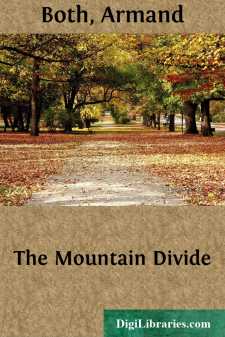Categories
- Antiques & Collectibles 13
- Architecture 36
- Art 48
- Bibles 22
- Biography & Autobiography 813
- Body, Mind & Spirit 142
- Business & Economics 28
- Children's Books 15
- Children's Fiction 12
- Computers 4
- Cooking 94
- Crafts & Hobbies 4
- Drama 346
- Education 46
- Family & Relationships 57
- Fiction 11828
- Games 19
- Gardening 17
- Health & Fitness 34
- History 1377
- House & Home 1
- Humor 147
- Juvenile Fiction 1873
- Juvenile Nonfiction 202
- Language Arts & Disciplines 88
- Law 16
- Literary Collections 686
- Literary Criticism 179
- Mathematics 13
- Medical 41
- Music 40
- Nature 179
- Non-Classifiable 1768
- Performing Arts 7
- Periodicals 1453
- Philosophy 64
- Photography 2
- Poetry 896
- Political Science 203
- Psychology 42
- Reference 154
- Religion 513
- Science 126
- Self-Help 84
- Social Science 81
- Sports & Recreation 34
- Study Aids 3
- Technology & Engineering 59
- Transportation 23
- Travel 463
- True Crime 29
The Mountain Divide
by: Armand Both
Description:
Excerpt
CHAPTER I
Night had fallen and a warm rain drifting down from the mountains hung in a mist over the railroad yards and obscured the lights of Medicine Bend. Two men dismounting from their drooping horses at the foot of Front Street threw the reins to a man in waiting and made their way on foot across the muddy square to the building which served the new railroad as a station and as division head-quarters. In Medicine Bend, the town, the railroad, everything was new; and the broad, low pine building which they entered had not yet been painted.
The public waiting-room was large, roughly framed, and lighted with hanging kerosene lamps. Within the room a door communicated with the agent’s office, and this was divided by a wooden railing into a freight office and a ticket and telegraph office.
It could be seen, as the two men paused at the door of the inner room, that the first wore a military fatigue-cap, and his alert carriage as he threw open his cape-coat indicated the bearing of an American army officer. He was of medium height, and his features and eyes implied that the storms and winds of the plains and mountains were familiar friends. This was Park Stanley, charged at that time with the construction of the first transcontinental railroad.
The agent’s office, which he and his companion now looked into, was half-filled with a crowd of frontiersmen, smoking, talking, disputing, asking questions, and crowding against the fence that railed off the private end of the room; while at the operator’s table next to the platform window a tall, spindling boy was trying in the confusion behind him to get a message off the wire.
Stanley, eying the lad, noticed how thin his face was and what a bony frame spread out under the roundabout jacket that he appeared already to have outgrown. And he concluded this must be the new operator, Bucks, who for some days had been expected from the East.
The receiver clicked insistently and Bucks endeavored to follow the message, but the babel of talking made it almost impossible. Stanley heard the boy appeal more than once for less noise, but his appeals were unheeded. He saw symptoms of fire in the operator’s eyes as the latter glared occasionally at the crowd behind him, but for what followed even Stanley was unprepared. Bucks threw down his pen and coming forward with angry impatience ordered the crowd out of the room.
He pushed the foremost of the intruders back from the rail and followed up his commands by opening the wicket gate and driving those ahead of him toward the door of the waiting-room. “Get out where you belong,” he repeated, urging the crowd on. Stanley turned to the man at his side. “I will go upstairs to write my message. This must be the new boy, Bob,” he added; “he acts as if he might make things go.”
His companion, Bob Scott, smiled as he followed Stanley out upon the platform and up the narrow stairway leading to the division offices. But Bob Scott was conservative. He never spoke above an undertone and naturally took the conservative side: “If he only doesn’t make them go too fast, Colonel,” was his comment....



